Posted by
Mordy Oberstein
**** them or hate them, Google is very good at what it does. While they certainly have their share of flops (G+), its main product, search, is head and shoulders above everyone else. The question is, why? Sure, I could go into all of the algorithmic underpinnings that make Google unique. We could go through a history of Google and how PageRank was entirely novel, and so forth. But instead of that, I’d like to take a more thematic look at everyone’s favorite search engine. Let’s pop the hood and take a deep look at Google’s traits and how that translates to it being the best search engine and more.
Strategically Speaking, What Makes Google So Good? (And the Lessons to be Learned)
I spend a lot of time on the Google SERP and that can be both a good thing and a bad thing. It’s good because I get a front-row seat to what Google is doing. At the same time, it means getting too caught up in too many details. What I’d like to do here is to take a step back and instead of talking about how good Google’s results are or how good it is at connecting entities or how far it goes to target users I want to take a look at the meta strategies Google takes to advance its ‘search’ market share.
What is Google thinking, what is Google’s approach to Search (and beyond), and how does that translate into market dominance? (And how can we incorporate it into our own planning?)
Above All Else, Google Understands Psychology
Far and above anything else that Google does to position itself within the search engine market, Google understands psychology. It’s not always easy to see, but Google is masterful at understanding how the human mind works and what’s important to it. Where other search engines might get hung up on their technical ability or the fact that they offer peripheral features (such as privacy in the case of DuckDuckGo), Google targets the heart of the human mind.
Have a look at this SERP:
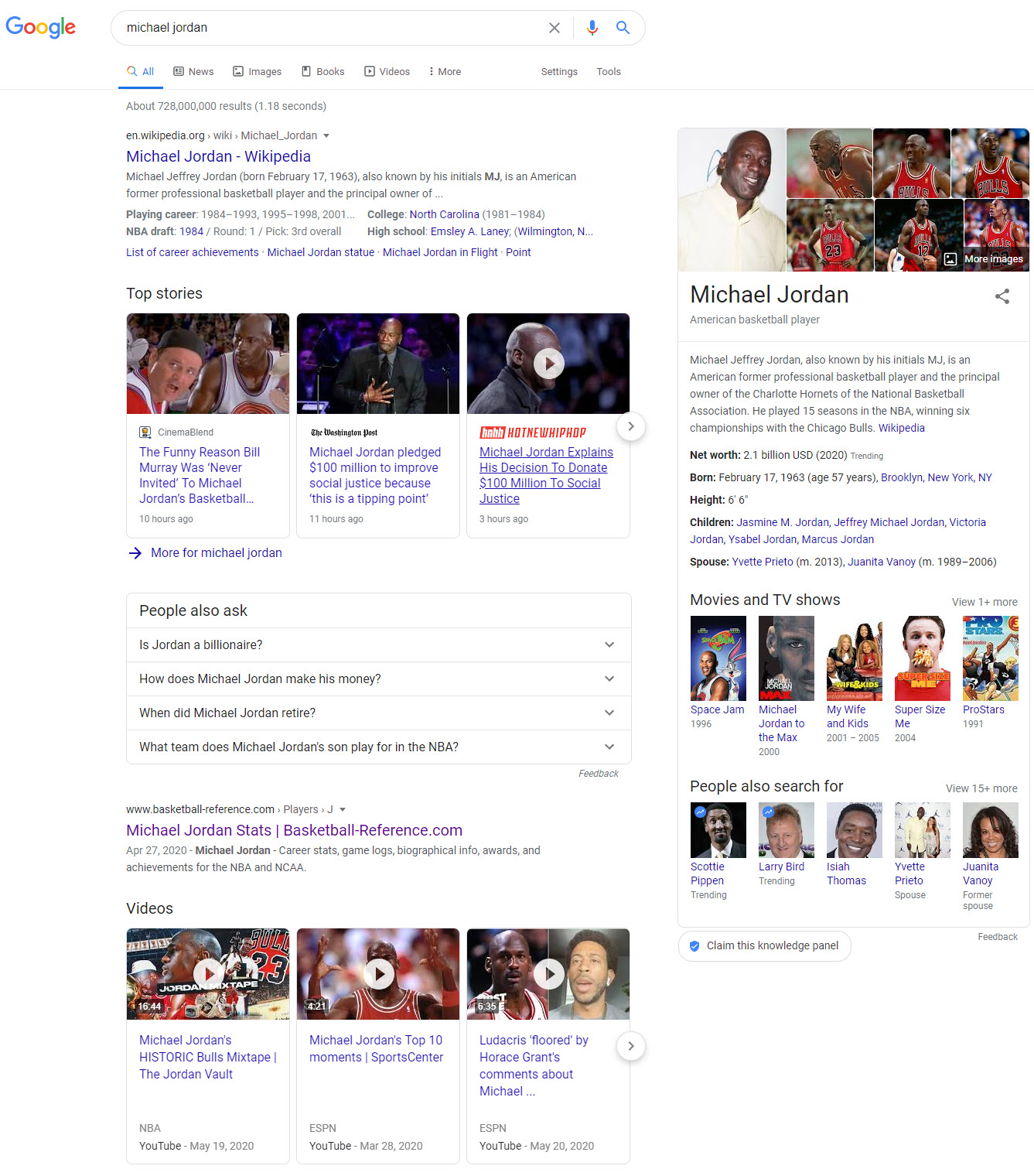
What do you see here? As SEOs, we tend to see Google limiting traffic to our site hence our need to construct a new SERP strategy. However, the user sees a ton of information. As a user, I feel like if there’s anything to know about this entity, I can find it right here!
This is not Google trying to offer the user an answer per se. I don’t think this paints a broad enough picture. As I’ve talked about before, the idea of Google offering answers as a way to keep the user on the SERP so as to drive ad clicks is a bit linear. It’s also out of character for Google, who very much plays the long game.
Google understands that what drives a user back to its results over and over is authority. Google realizes it’s not selling information per se, but it’s selling authority. Google knows that a user will return to search another day if they view the search engine as an expert, as something authoritative, and as something trustworthy. (Sound familiar?)
If you read my content regularly, I haven’t said anything new here. Yes, Google does something that I don’t think any other search engine does… it thinks about foundational psychology. So instead of worrying about relevancy and accuracy per se, it worries about authority (which is the parent concept of relevancy and so forth).
But the brilliance of Google is not only in its ability to understand the basic nature of the searcher and their psychological demands. Google also displays a level of genius in how they build this perception.
I’ve already spoken above about how offering direct information builds up an authority perception within the recesses of the user’s mind. But Google goes way beyond this. To establish an aura of authority, Google has done two other things that I think we should all incorporate into our own marketing strategy:
1) Google positions itself as an authority in a visible way.
2) Google creates a relationship of sorts with its users.
What do I mean?
Google Positions Itself as an Authority
Google is very good at strategically sending the user the message that it is an authority of the highest caliber. That is, Google places itself in the position of authority and then flaunts it.
The clearest example of this is a Local Service Ad:
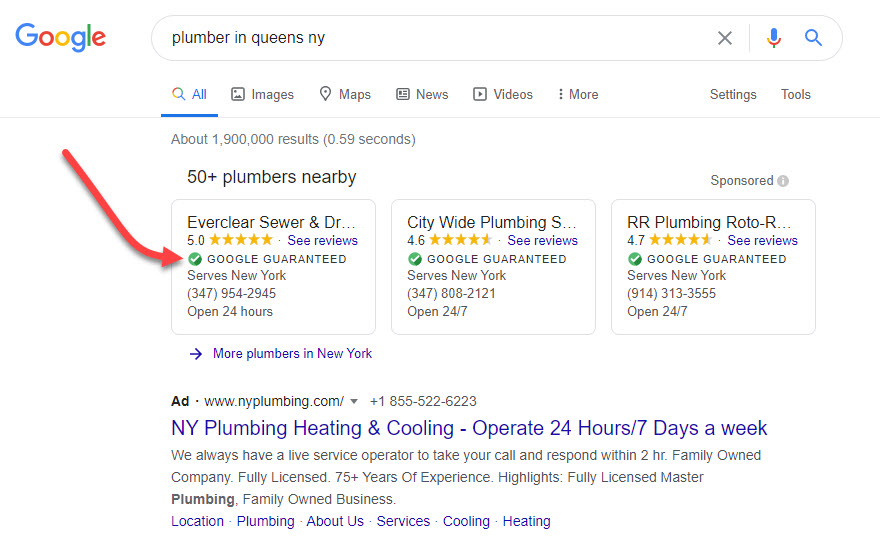
Google is not placing that green guarantee-logo just to tell the user that the service has been vetted. Vetting a business? I mean, what an odd thing for a search engine to even do. However, if we look at it from the lens of Google trying to place itself in the position of authority, it’s brilliant!
Whatever losses Google may suffer at the hands of guaranteeing shoddy work, it makes up in terms of perception as an authority. Why would I use Bing when I can use a search engine that simply oozes authority?
I should point out, Google’s positioning of itself into the authority role so as to speak to user’s psychology is far more subliminal than its local service guarantees. Here, in the below Local Pack, Google is all but telling the user that they are more attuned to the actual hours of these listings than the listings themselves!
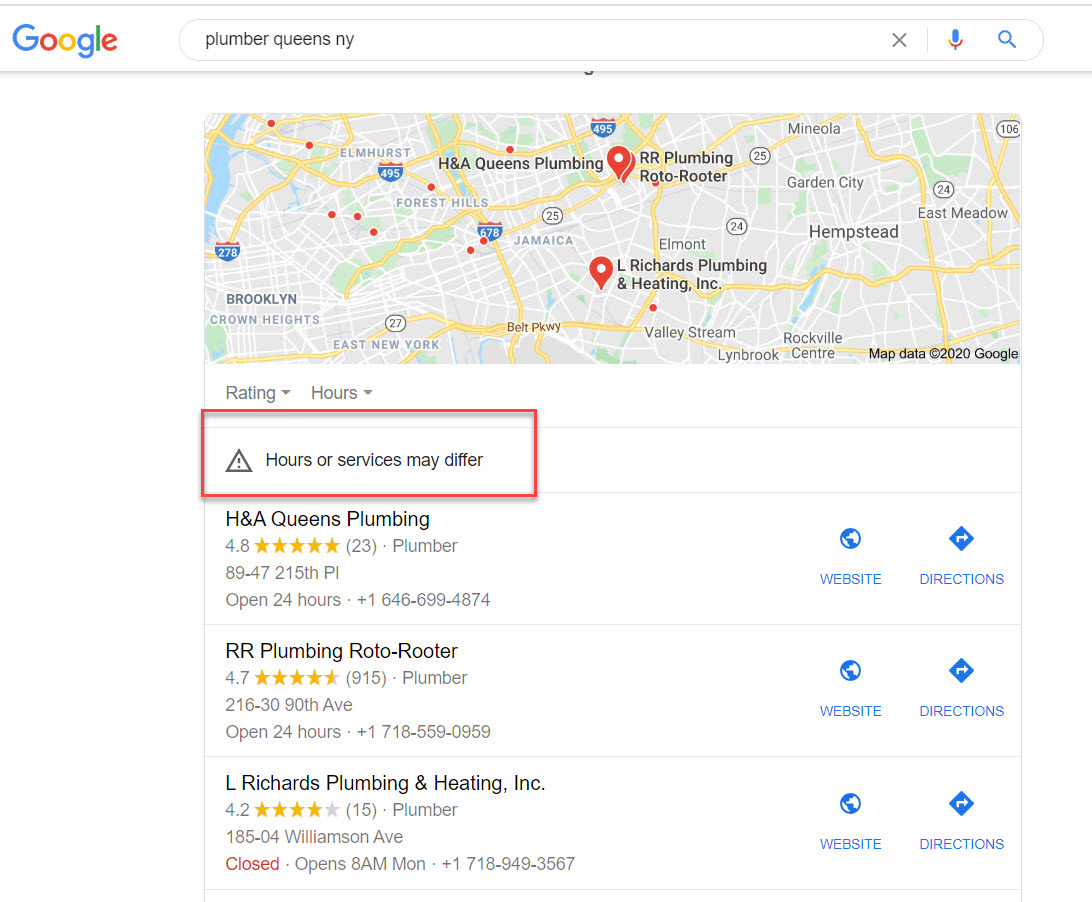
Google indicates that the hours presented by a specific listing may not be accurate as a result of COVID-19
By potentially correcting the listing’s own hours as a result of the COVID-19 crisis, Google has again placed itself in the position of the authority.
I mean, doesn’t Google telling you how busy a business is right now come off as a bit “Hey, we know everything!”?
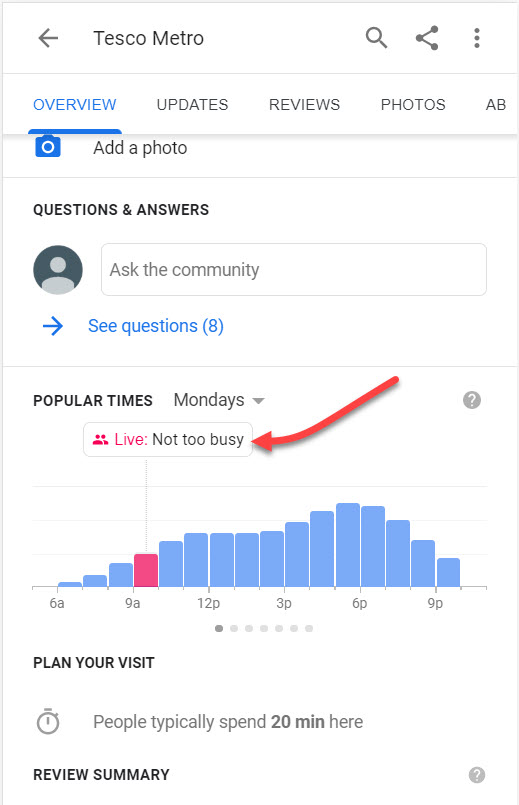
Google’s Popular Times feature showing how busy an establishment is in real-time
In other words, Google doesn’t just put content on the SERP so as to create the perception that is an authority. It doesn’t just sit back and wait for “authority to happen” – which would be extremely effective on its own. Rather, Google looks for opportunities where it can paint itself as the authority. It does so latently and it does so manifestly.
It’s a good lesson for us, particularly as it comes to our content strategy. Sure, traffic is great, but sometimes the content you write should be more focused on how it paints your brand than the number of users it brings in.
Google Creates a Real Relationship with Its Users
As part of its unparalleled ability to tap into user psychology, Google does an amazing job at creating a relationship with its users and in doing so reinforces the notion that they are the authority supreme!
Have you ever wondered why Google makes so many small and what might seem like trivial updates to its SERP features? I mean take the dictionary box it offers.
Does Google really need to add in a tool that shows you how to pronounce a word and then let you practice that word to make sure you say it correctly? Is that essential? Is that what a search engine should be focused on?
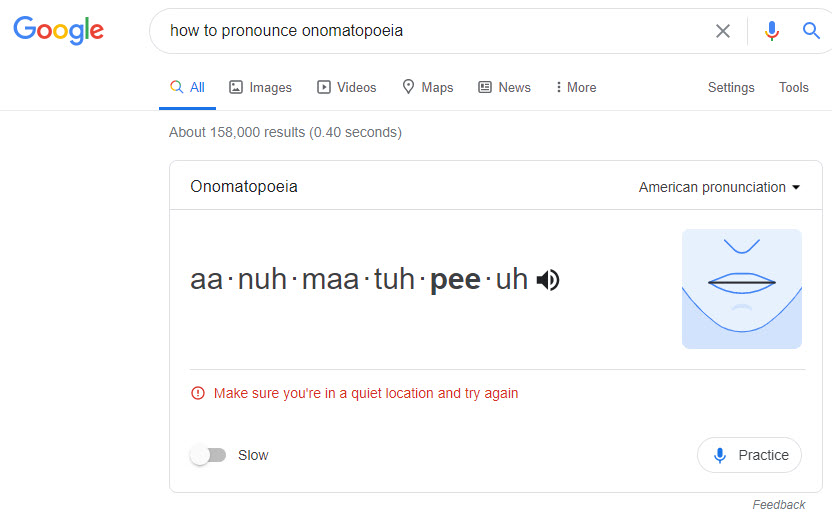
A Google feature that teaches you word pronunciation and allows you to test your own verbalization of the word
Does a search engine really need to help you learn English with the equivalent of flashcards on the SERP?
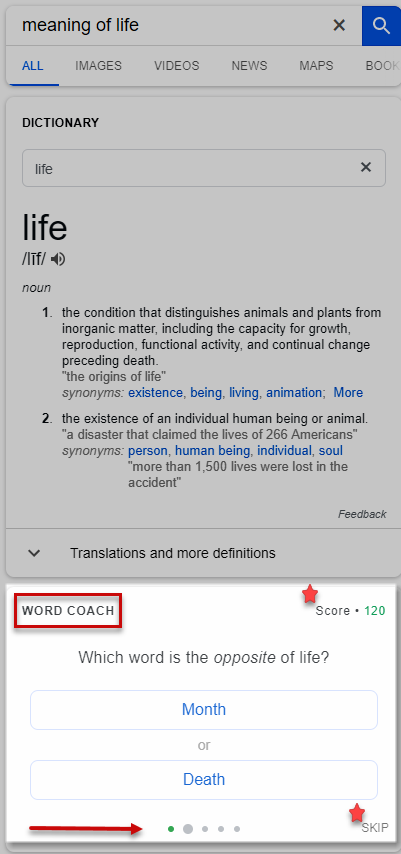
I mean, Bing doesn’t:
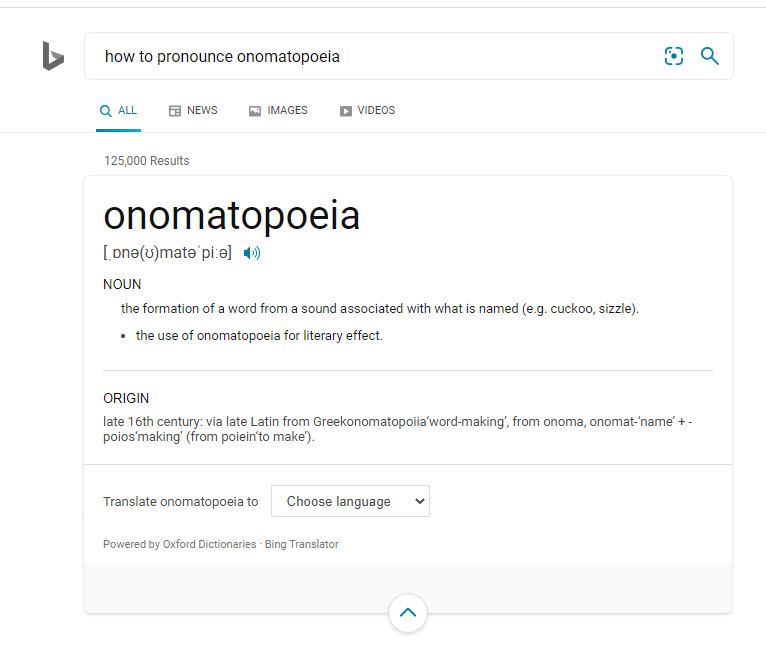
And this is Google’s genius. It doesn’t just present information, it uses the information it presents to create a relationship. Whether it be a way to hone your language skills or reserve a table at your favorite restaurant, Google goes the extra mile to offer its users helpful innovations.
While a certain update to a specific SERP feature might seem like overkill in isolation, from the perspective of creating a helpful relationship with the user, these minute details are incredibly important.
To ****, I have never seen anything like Google’s travel site. You simply can’t find a travel booking site that not only offers so much information but that allows for so much user interaction and input. There are so many opportunities for users to input what’s important to them on the site. Forget the mere practical advantage to this, what message does this send to the user? Well, it tells the user that Google is ready to listen to them and as a result be able to help them.
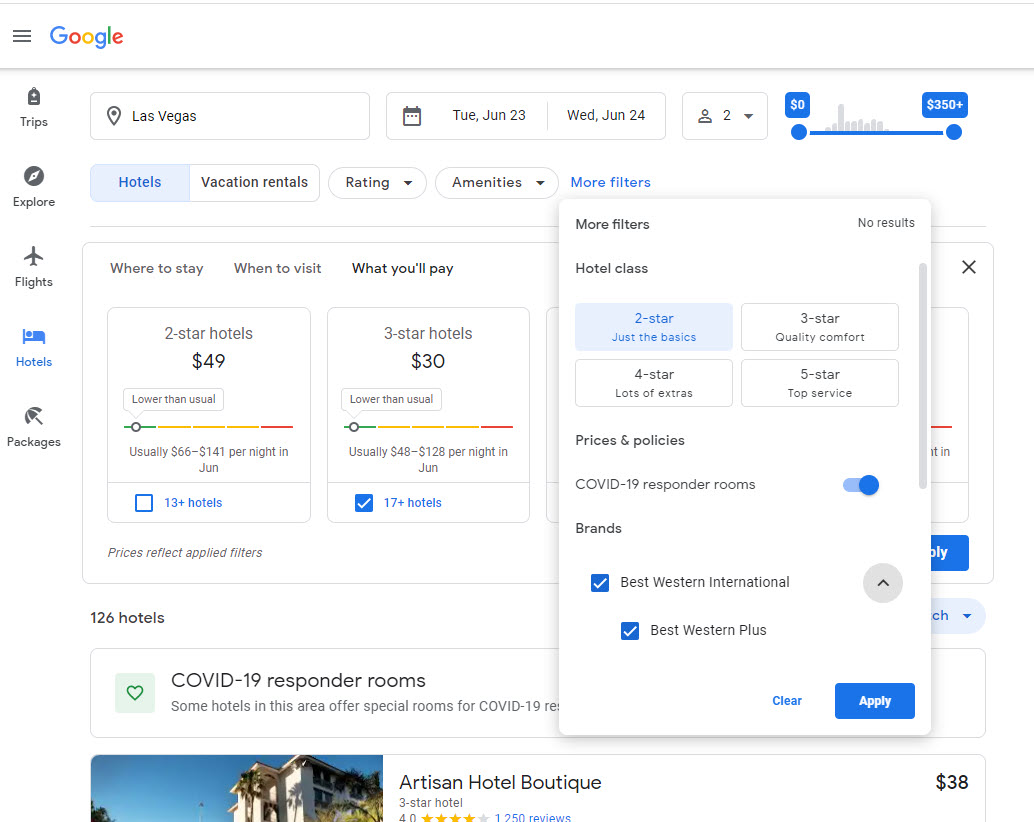
Google offers the user an array of inputs when using the Google travel site
That’s an incredibly powerful message that Google executes, not with words per se but with its UI and UX! That is, when Google designs something, it goes beyond asking itself what options the user wants but goes so far as to consider the message its functionality sends. That’s the difference-maker.
To bring this all full circle, Google using its properties to a relationship/interaction with its users both fosters a sense of trust and again positions the search engine as an authority. By creating interaction, by offering the user Google supplied information aimed at making their lives better and easier, Google acts as a trusted partner that is bathed in authority.
To me, offering users more opportunities to provide input on a page not only makes a page more interactive but provides the user with a sense of control and relationship between themselves and the interface. It’s something I think we could all do more of!
Google Pivots Really Quickly
Google is an incredibly large organism. It’s the kind of large-scale operation that you would think would be almost lethargic. However, Google has consistently shown that it can adjust to the world around it on a dime. This is an important commodity to a search engine that, as mentioned above, wants to come across as helpful, build relationships with its users, and most of all capitalize on authority.
You don’t have to look far to see this in action. Each and every month Google makes dozens of adjustments to its SERP. That said, if you want to see a clinic on adopting to a user’s needs quickly, have a look at how Google responded to COVID-19.
As the pandemic took hold of the world, Google quickly took to offer notification cards on applicable SERPS:
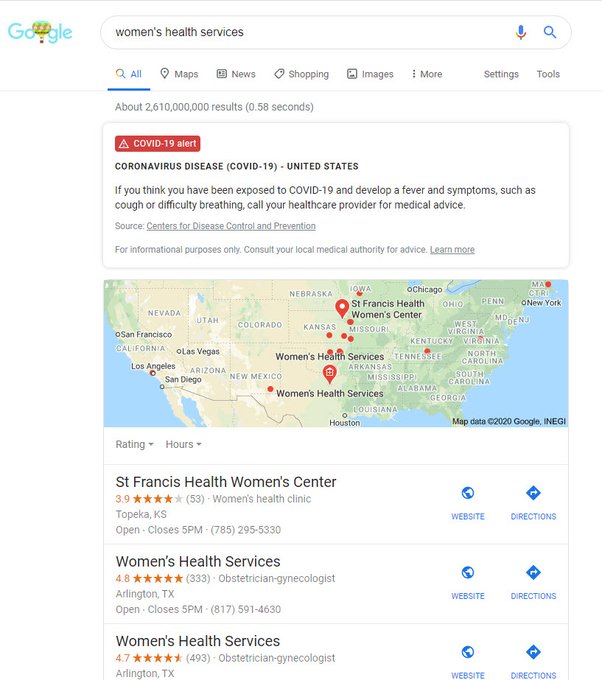
Soon after releasing these cards onto the SERP, Google decided to go full-on data for COVID-19 queries:
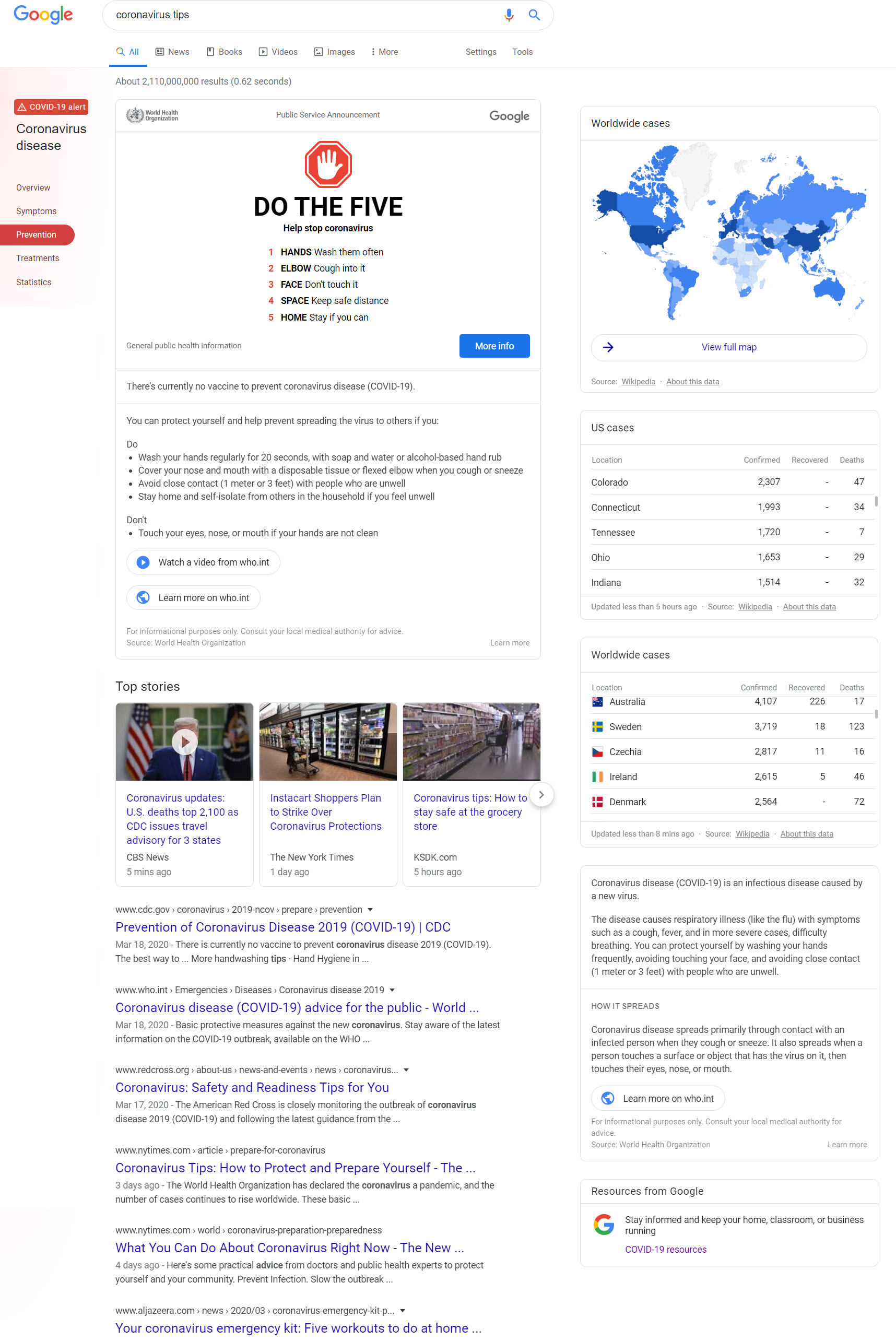
Parenthetically, nothing speaks to Google’s ability to come across as an authority than the incredible amount of data Google offers in the above.
But it’s not even this massive source of information that I’m really referring to. As the pandemic evolved, Google quickly moved to adapt to the new nature of the pandemic.
As businesses began to shutter, Google updated Google My Business to allow for a temporarily closed status:
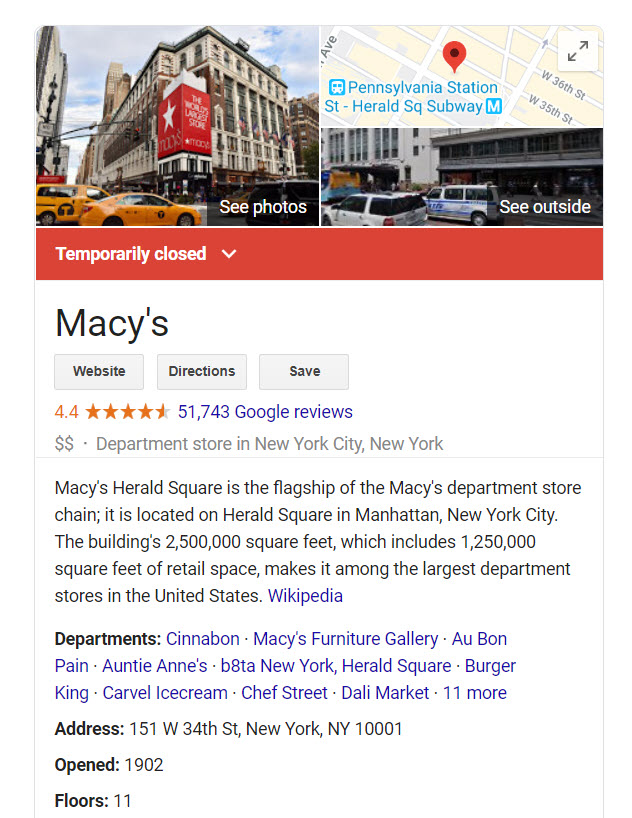
As takeout became the new norm, Google updated its Discover More Places carousel to always show cards for ‘Takeout’ and ‘Delivery’ first:
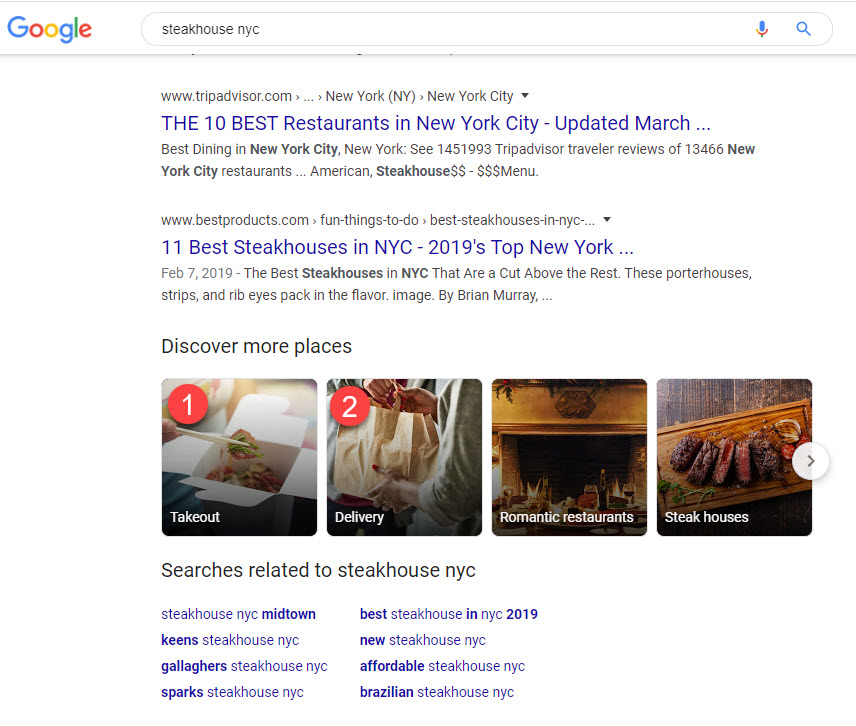
As testing for the virus came more and more into focus, Google gave easy access to the protocols medical facilities initiated for in-person visits:
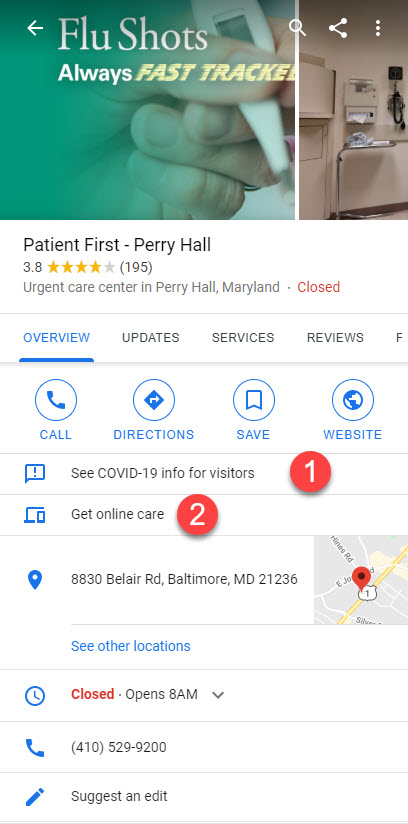
I could go on and on, but I think you get the point, Google pivots really quickly to meet user demand. In doing so, the search engine is able to fill its role as an authority and as a trusted source of pretty much everything.
I think a lot of Google’s constant experimenting goes to the notion that the search engine is constantly trying to evolve, adapt, and meet user needs in new ways. This mindset allows it to pivot when the circumstances around it change drastically.
Again, all of this does not go unnoticed by users and is a powerful reinforcement to Google’s quest to be a dominant knowledge authority.
Google Is Opportunistic
The idea of Google being opportunistic is probably the most controversial trait the search engine incorporates into its approach to innovation. While there are some controversial topics to hit on when talking about Google’s “expansion,” I merely want to show what Google does without getting too lost in the more *** button issues.
There is a myriad of examples to show how astute Google is in determining user needs and then moving aggressively to fill them. We can talk about how Google has turned its Local Panel into a booking center where you can make an appointment at a yoga studio, we can talk about how the Knowledge Panel includes every facet of information on everything from your pet to your favorite movie, but the two best examples I can think of are:
1) Google’s travel site
2) Google offering free shopping listings
How Google Took The Travel World by Storm
I don’t want to go too far down this wormhole as I already spoke about Google’s travel site earlier in this post. That said, the way Google saw an opportunity and then seized it here is nothing short of amazing.
Back in the fall of 2017, Google began to overhaul its hotel and flight features. In doing so the SERP became home to all sorts of pricing information and data, etc. It was totally novel in a lot of ways. What Google did was find the gap in what the traditional booking sites were offering (i.e., a lack of data and the like) so as to move quickly to fill that gap.
Over the course of what would be the next two years, Google added all sorts of data, trends, and options to its features that supported travel bookings until it launched its own travel site in May of 2019.
Now having a site of its own, Google went gaga with all sorts of options and filters that were supported by access to a prolific set of travel information. For example, Google will tell you the average temperature of a location during your planned visit, if hotels during that period are pricier than usual, and will even let you filter hotel results according to a specific neighborhood of a city.
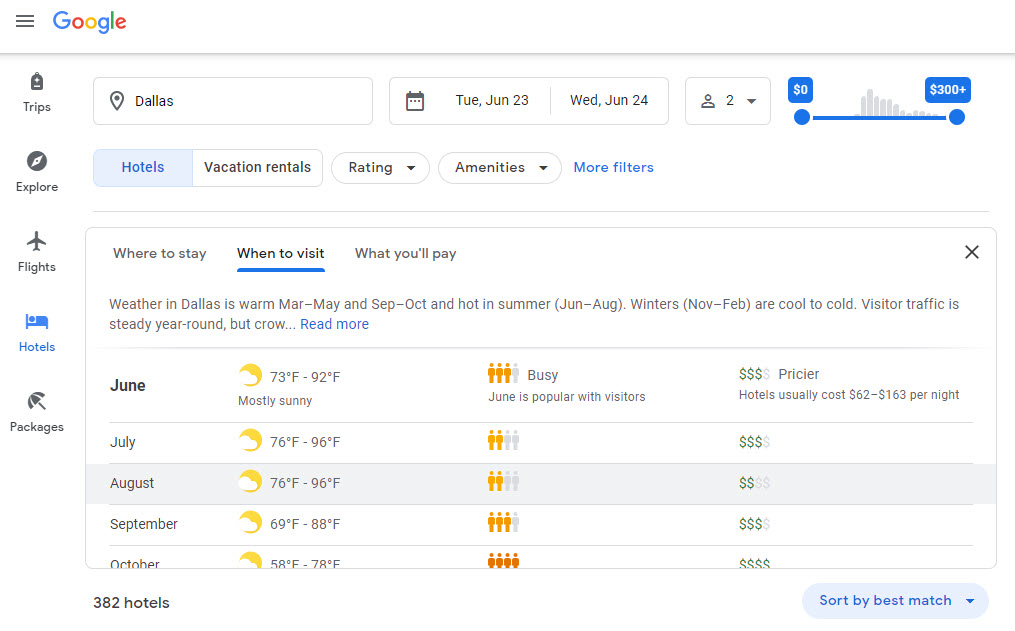
Google’s travel site offers an array of pertinent information such as the average temperature of a potential destination during each month of the year
Here, Google saw an opportunity to offer a new way to explore travel plans and seized it with an aggressive series of updates that spanned the better part of two years!
Google Offers Free Product Listings as COVID-19 Changes the Commerce Landscape
To me, Google’s handling of COVID-19 on the SERP (and beyond) has been emblematic of its overall approach and strategy. One of the clearest examples of this was when Google opened up Google Shopping to free product listings. Google offering retailers the ability to list products free of charge was inevitable. For Google Shopping to compete with Amazon, Google was going to have to open its listings up.
That said, Google’s timing here was testimony to its opportunistic nature. Once Google saw that the retail landscape had changed with COVID-19 and that online shopping was of even greater relevance, Google took the opportunity to bolster Google Shopping.
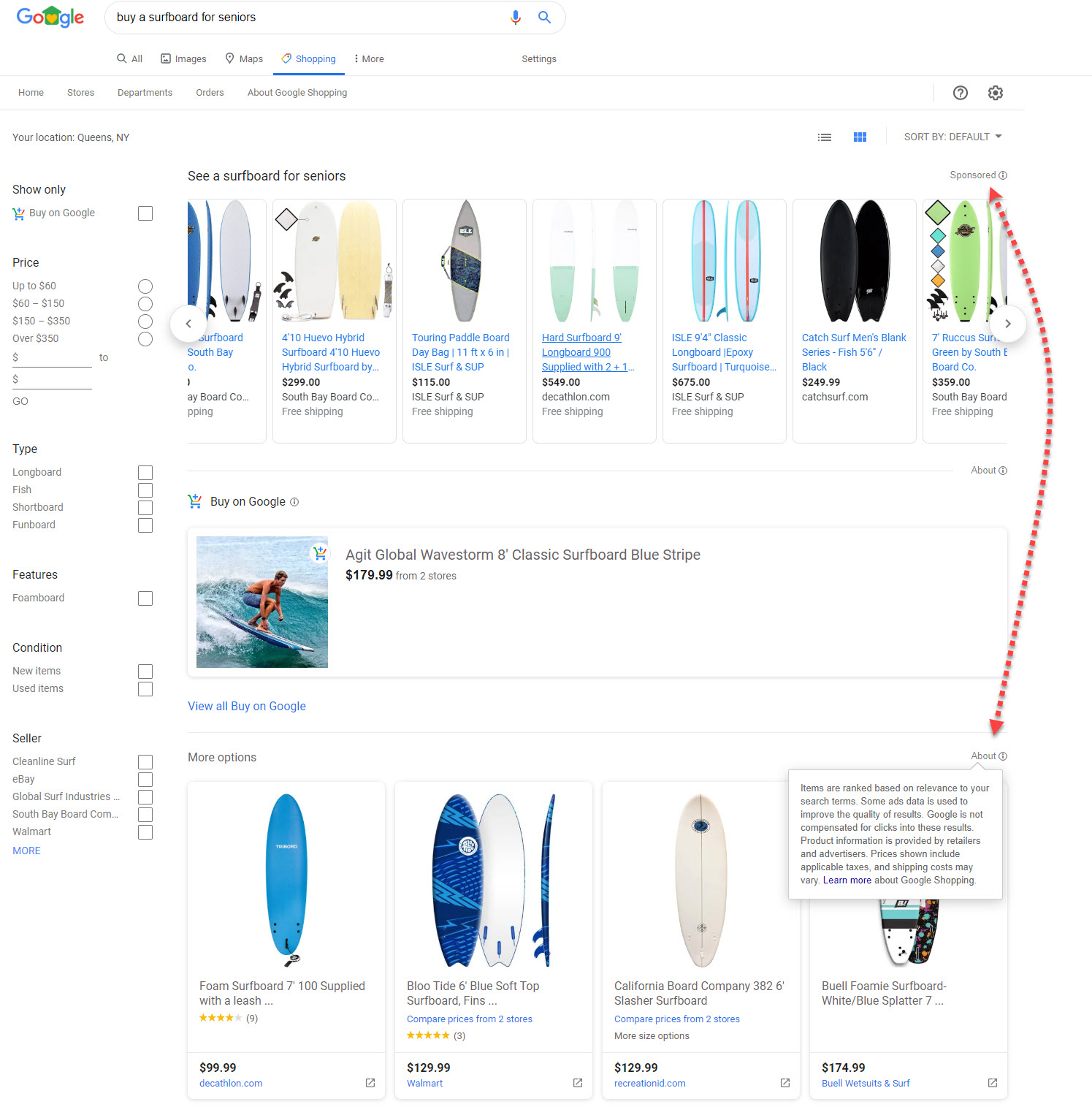
That is, just when more people than ever would be interested, almost desperate to get their products going online, Google announced it was opening up free Google Shopping listings in the US. Google, in the announcement, pretty much said as much. They indicated that free product listings were on the table prior to COVID-19 but the timetable to open up its shopping platform was pushed ahead to capitalize on the pandemics e-commerce impact.
Aggressively Opportunistic Does Not Mean It’s Wrong
Is Google’s opportunistic nature distasteful? If I had to answer that, I would say it often comes close, but no. With its shopping listings, Google had something it was working on (free product listings), it saw a new opportunity arise, and it grabbed it. There’s really nothing wrong here. In fact, it probably helped a lot of retailers.
I think the instances of free product listings during COVID-19 and the Google travel site are prime examples of Google hunting opportunity aggressively without crossing any real lines. It was not like hotel sites or booking sites were offering the information that Google now does. It was not as if Google pushed its way into the travel market by pushing out other sites. Rather the opposite, Google saw other sites leaving a wide gap in what users really wanted so they simply filled the gap and did so in a highly energetic way.
Google, quite often, is a case study in aggressively and relentlessly pursuing an opportunity without crossing any real lines (of course, there have been times where Google has perhaps taken things too far, but that’s for another time). For many marketers, Google is a good lesson is finding and taking the right opportunities in a highly energetic manner.
Boundlessly Unafraid

If I had to boil what Google does down into one underlying principle I would say the search engine is not afraid to go deep. Whether it’s a strategic analysis of user psychology or taking a two-year-long approach to seizing an opportunity in the travel market, Google is committed to going deep and going long. Google is very much an anomaly. It’s a tech giant acting like it’s Nike or Coca-Cola, with the latter brands being the pinnacle of tapping into the consumer’s mind. But that’s really Google’s underlying brilliance. It’s able to exist as a tech company and retain that identity all while behaving like how a retail company might be expected to.
It’s a wholly uncommon paradox that like it or not, leaves us with much to learn about our own marketing practices.

